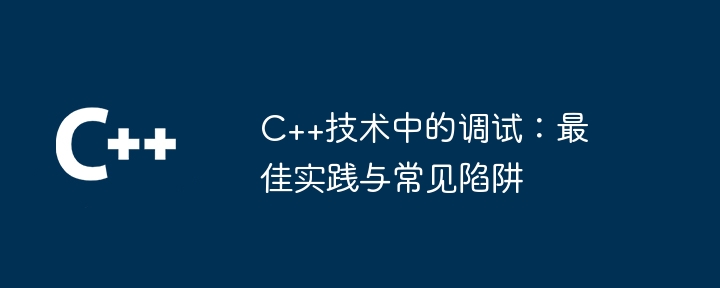
C Debugging best practices: Use breakpoints, step-by-step execution, logging, and version control. Common pitfalls: wrong breakpoints, debugging dependencies, variable overrides, memory leaks, and uncompiled code. Practical case: accessing released memory, using breakpoints and step-by-step execution to determine the root cause of the problem. By following best practices and avoiding pitfalls, developers can effectively debug C programs and ensure code quality.

Debugging in C Technology: Best Practices and Common Pitfalls
Debugging is a crucial step in the software development process , which allows developers to identify and resolve bugs in programs. As a powerful language, C provides a wealth of debugging tools and features. By following best practices and avoiding common pitfalls, developers can debug effectively and improve program quality.
Best Practices:
Common Pitfalls:
Practical case:
Consider the following C code:
#include <iostream>
int main() {
int* p = new int[10]; // 动态分配 10 个整数
std::cout << *p << std::endl;
delete[] p; // 释放内存
std::cout << *p << std::endl; // 访问已释放的内存
return 0;
}When this code is executed, the program will crash because in ## The #std::cout line attempts to access freed memory. By using breakpoints and stepping through, we can trace the variable p and determine that after delete[] p its value is 0xcccccccc, indicating that the memory has been freed.
Conclusion:
By following best practices and avoiding common pitfalls, developers can effectively debug C programs. Using techniques such as breakpoints, logging, and error handling can simplify the debugging process, identify and solve problems in your program, and ensure the high quality and reliability of your code.The above is the detailed content of Debugging in C++ Technology: Best Practices and Common Pitfalls. For more information, please follow other related articles on the PHP Chinese website!
 What are the differences between c++ and c language
What are the differences between c++ and c language
 Recommended learning order for c++ and python
Recommended learning order for c++ and python
 Cost-effectiveness analysis of learning python and c++
Cost-effectiveness analysis of learning python and c++
 Is c language the same as c++?
Is c language the same as c++?
 Which is better to learn first, c language or c++?
Which is better to learn first, c language or c++?
 The difference and connection between c language and c++
The difference and connection between c language and c++
 C++ software Chinese change tutorial
C++ software Chinese change tutorial
 Cost-effectiveness analysis of learning python, java and c++
Cost-effectiveness analysis of learning python, java and c++




